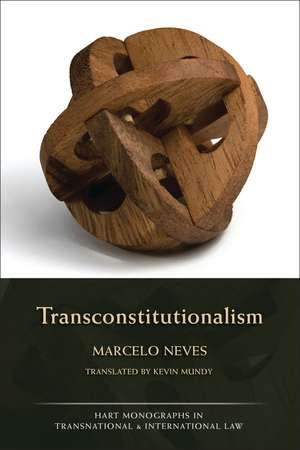Transconstitutionalism: Hart Monographs in Transnational and International Law
Autor Marcelo Neves Traducere de Kevin Mundyen Limba Engleză Hardback – 30 apr 2013
Din seria Hart Monographs in Transnational and International Law
-
 Preț: 320.53 lei
Preț: 320.53 lei - 27%
 Preț: 380.94 lei
Preț: 380.94 lei - 30%
 Preț: 568.40 lei
Preț: 568.40 lei - 30%
 Preț: 568.80 lei
Preț: 568.80 lei - 22%
 Preț: 233.46 lei
Preț: 233.46 lei - 27%
 Preț: 377.30 lei
Preț: 377.30 lei - 18%
 Preț: 317.05 lei
Preț: 317.05 lei - 30%
 Preț: 541.20 lei
Preț: 541.20 lei - 21%
 Preț: 262.09 lei
Preț: 262.09 lei - 30%
 Preț: 602.92 lei
Preț: 602.92 lei - 16%
 Preț: 1077.89 lei
Preț: 1077.89 lei - 30%
 Preț: 777.47 lei
Preț: 777.47 lei - 30%
 Preț: 543.00 lei
Preț: 543.00 lei - 22%
 Preț: 270.67 lei
Preț: 270.67 lei - 18%
 Preț: 299.86 lei
Preț: 299.86 lei
Preț: 540.31 lei
Preț vechi: 773.98 lei
-30% Nou
Puncte Express: 810
Preț estimativ în valută:
103.38€ • 108.52$ • 85.81£
103.38€ • 108.52$ • 85.81£
Carte tipărită la comandă
Livrare economică 10-24 aprilie
Preluare comenzi: 021 569.72.76
Specificații
ISBN-13: 9781849464185
ISBN-10: 1849464189
Pagini: 246
Dimensiuni: 156 x 234 x 22 mm
Greutate: 0.54 kg
Ediția:New.
Editura: Bloomsbury Publishing
Colecția Hart Publishing
Seria Hart Monographs in Transnational and International Law
Locul publicării:London, United Kingdom
ISBN-10: 1849464189
Pagini: 246
Dimensiuni: 156 x 234 x 22 mm
Greutate: 0.54 kg
Ediția:New.
Editura: Bloomsbury Publishing
Colecția Hart Publishing
Seria Hart Monographs in Transnational and International Law
Locul publicării:London, United Kingdom
Caracteristici
This book is a study of Transconstitutiononalism which is a concept used to describe what happens to constitutional law when it is emancipated from the state.The author considers the way Transconstitutionalism is evolving and how it effects legal systems.The book was originally published in Brazil in Portuguese but has since been updated and translated into English.
Notă biografică
Marcelo Neves is Professor of Public Law and Legal Theory at the University of Brasilia. He has previously taught and studied at the European University Institute in Florence, the Johann Wolfgang Goethe University in Frankfurt, the London School of Economics, and at the universities of Bremen, Fribourg and Flensburg.
Cuprins
Introduction 1. Theoretical Background I. Constitution as Metaphor? II. The Premodern Hierarchical Social Formation III. The Transition Period: Charters of Freedom or Political Settlements IV. Multicentric Modern Society V. From Structural Couplings to Transversal Rationality 2. From Transversal Constitution . . . I. The Constitution of ConstitutionalismII. The Transversal Constitution of the Constitutional State III. Transversal Constitutions beyond the State? 3. . . . to Transconstitutionalism between Legal OrdersI. Transconstitutionalism between Legal Orders as a Model for Treating Constitutional Problems II. Transconstitutionalism between International Public Law and State Law III. Transconstitutionalism between Supranational Law and State Law IV. Transconstitutionalism between State Legal Orders V. Transconstitutionalism between State and Transnational Legal Orders VI. Transconstitutionalism between State Legal Orders and Extra-state Local Orders VII. Transconstitutionalism between Supranational Law and International Law 4. Transconstitutionalism in a 'Multilevel' or Multicentric World Legal System I. Multiangle Transconstitutionalism between Orders of the Same Kind and Orders of Different Kinds II. Pluridimensional Transconstitutionalism of Human Rights III. Outlines of a Methodology of Transconstitutionalism 5. Excursus: Limits and Possibilities of Transconstitutionalism in Terms of Empirical Conditions, Functional Requirement and Normative Claim I. Empirical Conditions: Transconstitutionalism versus Asymmetry of the Forms of Law II. Functional Requirement: Beyond Constitutional Utopia and Fragmentation - Promoting a 'Differentiated Communication Order' (System Integration) III. Normative Claim: Beyond Hegemony and Community - Promoting Inclusion ('Social Integration') Final Comment: The Other Can See Your Blind Spot
Recenzii
.the book combines a thorough (systems) theoretical understanding of constitutional law and world society with a detailed analysis of its implications for concrete cases in this highly complex field. The author deals with a rich pool of theoretical scholarship, including Niklas Luhmann, Gunther Teubner, Hans Kelsen, Martti Koskenniemi, and Anne-Marie Slaughter; but even more importantly for the reader, he also draws on a rich pool of examples of transconstitutional problems. Thus, the book gives a new impulse to the ongoing debate on global constitutional law. It helps practitioners, especially constitutional judges, to comprehend the social conflicts that (invisibly) determine their decisions. For scholars, the book provides an example of the operationalization of system theory to address normative problems in a multicentric world.
Descriere
Transconstitutiononalism is a concept used to describe what happens to constitutional law when it is emancipated from the state, in which can be found the origins of constitutional law.
